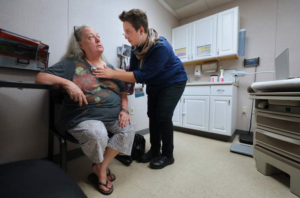In the Media
 The nurses’ station at the Russian River Health Center in Guerneville is a cramped room with a computer station on each wall for the center’s lead medical assistant and three nurses.
The nurses’ station at the Russian River Health Center in Guerneville is a cramped room with a computer station on each wall for the center’s lead medical assistant and three nurses.
The room is connected to another medical office, a narrow space that looks more like a hallway. Nurses, doctors and medical assistants deftly navigate their tight quarters, providing health care to some of the most vulnerable residents in Guerneville and other lower Russian River communities.
“It’s not an ideal setting,” said Jerry Elliott, a physician assistant at the Russian River Health Center. “It’s a good building, but the soundproofing isn’t great and the insulation isn’t great.”
The clinic’s modular buildings were erected less than a year after an arson fire in late 2015 destroyed the original Russian River Health Center. Even that building, a converted residence used as a community clinic since 1974, was less than ideal.
Now the Guerneville clinic is going to get a modern home. On Friday, operator West County Health Centers broke ground on the $14 million Russian River Health & Wellness Center and expects to finish construction and open the 10,000-square-foot medical and dental clinic’s doors by late 2020.
After more than 40 years WCHC is now providing health care to 15,000 patients who receive full-service medical care from clinics in Occidental and Sebastopol and the teen clinic and wellness center in
Congratulations to Dr. Trina Bowen of Occidental Health Center for being awarded the Reader’s Choice for Best General Physician in Sonoma County.
West County Health Centers was awarded the Reader’s Choice for Best Healthcare Clinic in Sonoma County
West County Health Centers needs cash donations to help provide direct support for flood victims through a West County Health Centers Patient Hardship Fund, the health center announced last week.
“Most patients seeking care at the clinic in Guerneville are seeking help refilling prescriptions lost during the chaos of the flood,” said WCHC Deputy Chief Medical Officer Dr. DeEtte DeVille, who is also medical director at the Russian River Health Center in Guerneville.
“Now that people are deep in cleanup, bacterial infections and intestinal bugs could be next,” said DeVille, in a media announcement of the fund last week. “In the near future, we anticipate an increased need for behavioral health services to help our patients cope with the hardships that come with surviving a flood.”
Public transportation vouchers, co-pays to replace prescriptions, durable medical equipment, emergency nutritional needs, identification replacement and other small emergency needs will be funded with the for hardship fund donations.
West County Health Centers, which operates clinics in Guerneville, Occidental, Sebastopol and Forestville, is helping its patients recover from the physical and mental toll left by the region’s worst flood in two decades. The clinic in Guerneville suffered $200,000 in missed appointments, a damaged furnace and cleanup costs, said Jennifer Neeley, associate director of development for West County Health Centers. The nonprofit has been operating in the county for over 40 years, offering services to everyone regardless of medical coverage. Although the clinic was without power for several days during the storm, it has since reopened and is seeing patients, Neeley said.
“People have been really responsive to our efforts to keep supporting flood victims and our cleanup efforts,” she said.
GUERNEVILLE — Parting her patient’s blonde hair in an exam room Tuesday, Dr. DeEtte DeVille took a closer look at a bruise incurred when Colette Bias tripped and fell into waist-deep water during last week’s flood, hitting her head on a tree branch.
“I don’t see any broken skin, did you notice blood?” asked DeVille, medical director of Russian River Health Center in Guerneville.
“No, just a really bad headache,” said Bias, 50, of Monte Rio, a U.S. Marine Corps veteran.
DeVille ordered medications for Bias to pick up at the pharmacy — she’d lost a bag with some belongings when she fell — including an ointment for a rash she’d developed on her face and legs.
When the Russian River flooded its banks last week, its fast-moving murky waters created a potential health hazard for people trying to get out of the area or, like Bias, seek supplies such as fuel and food. The floodwaters receded Friday after thoroughly tossing the contents of thousands of garages, RVs, vehicles, businesses and homes in the towns along the river, and leaving behind a mixture of sewage, gasoline, chemicals and mud.
Most just call it the “flood crud.”
On a typical workday in Guerneville, family doctor Jared Garrison-Jakel attends to patients who are often dealing with more than just an ailment medicine can cure. His patients at the Russian River Health Center include those who do not have a permanent home, are struggling with substance abuse or living with some other mental health disorder — all of which make scheduling a doctor’s appointment a difficult or even impossible task.
“If you don’t know where you are sleeping tonight, making an appointment two or three weeks in advance doesn’t work,” he said. “We need immediacy.”
With this challenge in mind, Garrison-Jakel, of Forestville, implemented a new model for West County Health Centers (WCHC) to see un-housed patients on the same day they schedule the appointment. The new system has proven to be a success, serving on average five un-housed patients a day.
“It’s always been my goal as a family doctor to meet the needs of the community,” Garrison-Jakel said.
Resiliency is defined as the ability to overcome and bounce back from challenges of all kinds- traumatic events, tragedy, loss, personal crises and regular life problems.
The October North Bay fires and their aftermath present many challenges to the residents of Sonoma County, including how to be resilient in the face of so much widespread devastation.
Private health networks, like West County Health Centers, have also seen an increase in cases of depression and anxiety and other chronic illnesses, officials said. The issues have been exacerbated by how far from normal many victims lives have veered. Many have seen their churches, jobs, and children’s school – thier daily rhythms – disrupted.
"People are more susceptible to trauma because they don’t have their normal community support," said Jason Dunningham, medical director of West County Health Centers, which provides services from several locations. "Initially we had this community coming together, and it was actually life-giving. They were supporting one another. We aren’t putting the same attention on those feelings as we did the first two weeks."
Cunningham said his staff compared state maps of fire damage to maps of where existing patients live, in order to locate high-risk victims who might need extra support. Health workers called those people in the weeks after the fires to check in and offer resources, everything from help with FEMA applications to therapy referrals.
"We know these people," Cunningham said. "We want to hear how they’re doing and hear their story. It’s a familiar voice to connect with. That social support is important so they don’t try to self-medicate with things like alcohol."










